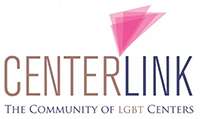CenterLink
CenterLink is an American member-based coalition of community centers serving the lesbian, gay, bisexual and transgender (LGBT) communities. The organization, founded in 1994 as the National Association of LGBT Community Centers, provides services which support the development of LGBT community centers.[3][4] Based in Fort Lauderdale, Florida, CenterLink also works with other national organizations to advance the rights of LGBT individuals and to provide LGBT community centers with information and analysis of key issues.[5]
 CenterLink's logo | |
| Founded | 1994 [1] |
|---|---|
| Type | Non-profit |
| 52-2292725 | |
| Location | |
Key people | Terry Stone, executive director |
Revenue | $356,160 (2011) [2] |
| Website | lgbtcenters |
Formerly called | National Association of LGBT Community Centers |
CenterLink produces an annual summit for executive directors and board leaders of LGBT community centers and provides technical assistance and support to over 500 individuals and centers every year.[1]
Membership
CenterLink comprises over 140 LGBT community centers across the country in over 40 states and the District of Columbia, as well as centers in Australia, Canada, and Cameroon,[4][6] which in turn serve over 600,000 people.[5][7]
Of the member community centers, 40% provide direct health care and 10% of these centers exclusively serve LGBT communities of color, youth, seniors or women. Half of the LGBT community centers have budgets under $50,000 and no full-time staff.[7]
CenterLink's website currently provides a web-based directory (and map) of community centers both within and outside of the United States, including Australia, Canada, and Cameroon.[6]
Current members of CenterLink include:[6]
- Center on Halsted
- Cimarron Alliance Foundation
- Hudson Pride Connections Center
- Hudson Valley LGBTQ Community Center
- KICK (Detroit)
- Lesbian Gay Bi Transgender Community Center of Metropolitan St. Louis
- Lesbian, Gay, Bisexual & Transgender Community Center
- Los Angeles Gay and Lesbian Center
- Oklahomans for Equality
- Pacific Center for Human Growth
- RU12? Community Center
- Ruth Ellis Center
- San Francisco LGBT Community Center
- Utah Pride Center
- William Way LGBT Community Center
History
In July 1987 Eric Rofes and Richard Burns convened a gathering of lesbian and gay community center leaders at the Los Angeles Gay and Lesbian Community Center in conjunction with the National Gay and Lesbian Health Association annual conference, seeking to build peer support and an exchange of ideas.[1]
In June 1994[4] the heads of the Dallas, Denver, Los Angeles, Minneapolis and New York Centers (respectively, John Thomas, Kat Morgan, Lorri L. Jean, Ann DeGroot and Richard Burns) launched the National Association of LGBT Community Centers as part of the celebrations marking the 25th Anniversary of the Stonewall Rebellion with the goal of strengthening the movement of LGBT community centers. At that time, more than thirty centers gathered for an all-day meeting at the Lesbian & Gay Community Services Center of New York during the Stonewall 25 commemorations.[1]
The Association began organizing twice-yearly annual meetings, in conjunction with the Health Association conference and the National Gay and Lesbian Task Force's Creating Change Conference. Regional meetings also were organized around the country. Without paid staff, the Association relied for many years on the leadership and coordination efforts of an annually elected Executive Committee composed of seven leaders of member centers.[1]
In January 2004, CenterLink hired its first executive director and opened a national office in Washington, DC. CenterLink has greatly enhanced its visibility with LGBT community centers and laid the foundation to make ongoing support and technical assistance available. We continue to intensify our efforts to build sustainable LGBT community centers to ensure that LGBT people have access to, and benefit from, identity affirming and life-saving services and programs.[1]
In 2008 the Association changed its name to CenterLink.[1]
References
- "Our History". CenterLink. Retrieved February 9, 2013.
- "CenterLink". GuideStar. Retrieved February 9, 2013.
- "LGBT Organizations Helps Gays to Plan Their Retirement". SouthFloridaGayNews.com. January 24, 2013. Retrieved February 9, 2013.
- "Braxton Elected to CenterLink Board". Vital Voice. Archived from the original on January 20, 2013. Retrieved February 9, 2013.
- "All About CenterLink". CenterLink. Retrieved February 9, 2013.
- "Member Directory". CenterLink. Retrieved February 9, 2013.
- "2010 LGBT Community Center Survey Report" (PDF). Movement Advancement Project. 2010. Retrieved February 9, 2013.